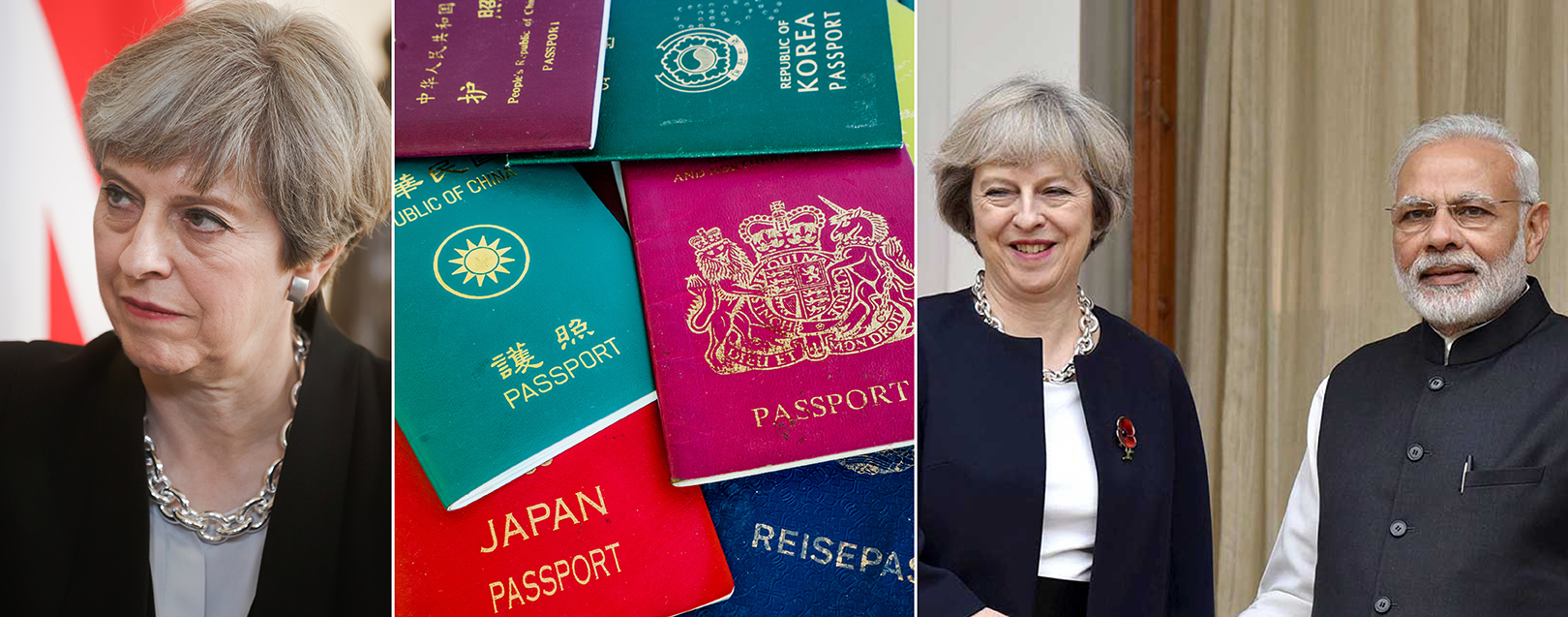
FTA between UK and India will be easier to accomplish once UK exits EU, Sujit Nair
by Sheela Mamidenna
UK and India share an age-old history of common interests and values and with India’s rapid rise to fame as the ‘fastest growing large economy’ in the world, the relations between the two countries could ‘reboot’ as Theresa May had expressed during her visit to India in November last year.
UK is India’s 5th largest trading partner and a great place for Indian businesses and will remain so post-Brexit for many reasons. However, trade bodies like FICCI voiced a negative sentiment saying that trade between India and UK is likely to suffer due to the Brexit vote and a decline in sterling. There are over 800 Indian businesses operating in the UK and serving as a gateway to Europe.
Experienced voices in the trade industry say that UK’s desire to develop and widen international trade relations, could in a way ensure there is a renewed emphasis and commitment to the relationship between the two countries. Bringing clarity to these thoughts Sujit S Nair (SN), Director and Chief Coordinator of British South India Council of Commerce in an interview with The Dollar Business (TDB) spoke about UK’s post-election scenario, India-UK visa challenges, the roadblocks in India-UK FTA and the advantages and disadvantages of Brexit for UK’s economy.
TDB: India was amongst the first few foreign visits that Theresa May undertook after coming to power. What is India’s significance in Britain’s post-Brexit economy?
SN: India's significance in post-Brexit Britain will depend on the terms of negotiation between the European Union and Britain. If Brexit turns out to be hard, whereby UK gives up full access to the single market and full access to the customs union, along with the EU, then the relationship with India will be one of the top priorities of the UK government. This is because hard Brexit will give full power to Britain to control its borders and make new trade deals and this helps to seal the FTA between the UK and India on a priority basis.
If the Brexit turns out to be soft, then this approach would leave the UK's relationship with the European Union as close as possible to the existing arrangements. If the UK accepts soft Brexit, then the European Union will insist on agreeing to the free movement of goods, services, capital and people. In this scenario, I do not see much improvement in the UK-India relation nor will India have a significant role in post soft-Brexit Britain.
TDB: Post-election, UK seems to be dithering on many fronts. Do you think by relying on the support of Democratic Unionist Party (DUP), UK’s Brexit interests will be served?
SN: DUP had supported Brexit and therefore, Theresa May government might not have many issues regarding Brexit as both the parties are on the same platform. But the challenge still remains on what components of the Brexit deal will DUP support. For example, DUP leadership is strongly opposed to a hard border between Northern Ireland and Ireland, which is a member country of the European Union. If Theresa May government agrees to a hard Brexit, then it will create a strong border between Northern Ireland and Ireland, which might affect the relationship between the Conservative Party and DUP.
TDB: What happens to UK and the Brexit talks if Theresa May loses her leadership?
SN: As Brexit was decided through a democratic process, any leader who comes to 10 Downing Street (Home of the British Prime Minister), is obliged to take forward the process. But what might differ is how the final Brexit deal might look like. Under Theresa May government, it strongly prefers a hard Brexit which will give full power to Britain to control its borders, make new trade deals and replace all EU laws with UK laws.
In the case of another leader, he or she might prefer a soft Brexit, which would leave the UK's relationship with the European Union as close as possible to the existing arrangements. In this scenario, UK would need to agree with the free movement of goods, services, capital and people.
TDB: Since May is relying on DUP to form the government, what kind of a scenario do you envisage if the talks with DUP decline.
SN: The present set of negotiation between May and DUP does not focus on a coalition government but on the strategy of "confidence and supply”, whereby DUP will back the Theresa government on certain issues rather than being part of the government. I believe that DUP strategy to support Theresa May is to less to do with ideology or their liking of Theresa May and more to do to prevent Labour leader Jeremy Corbyn from becoming the Prime Minister. Other major UK Parties like the Liberal Democrats, Scottish National Party, Sinn Fein etc. are more inclined to support Jeremy Corbyn rather than Theresa May. Therefore, the DUP is in a very powerful position with just 10 MPs whereby they can not only influence government policy but can force another general election if they no longer wish to support Theresa May government and if Jeremy Corbyn or any other leader does not get the requisite number to form a new government. But I feel that the DUP might want to continue playing the King marker as this is what they wished after the 2015 general elections and was able to achieve it only in the 2017 general elections. This is an opportunity which they might not want to miss as it provides them with the best chance ever of holding the balance of power.
TDB: The visa issue has prompted the Indian Commerce Minister to say that the ‘visa issue sounds like non-tariff barriers in services sector’ and that UK is ‘no longer treating India as an old friend’. Do you think there will be any improvement on India-UK ties after Britain leaves EU?
SN: One of the major reasons why UK wants to leave the EU is to restrict the movement of people from other European Union countries to its own. Therefore, I really do not see a scenario whereby UK would want people from India to have more than the current level of access to the UK job market. Under the current administration and policies pursued by the UK government, I do not see much of the improvement on the visa issue anytime soon.
TDB: How did Philip Hammond’s visit contribute to stronger India-UK ties?
SN: Senior political leaders from the UK have been visiting India over the last few months to strengthen the relationship with India. Philip Hammond led a delegation which included some of the UK’s most experienced leaders in financial services and FinTech entrepreneurs. The major agenda of the visit was to position the UK as India's financial partner for raising the finances which are required for India's rapid growth. In this context, Philip Hammond had also coined a catchy line "Make in India, Finance in UK”. India might want to wait for the outcome of the Brexit negotiations before finalising any serious initiatives with the UK. This is because UK’s relations with any country in the world will be determined wholly by the outcome of Brexit negotiations.
TDB: With the focus of the developed world increasingly shifting towards bilateral trade treaties, what are the prospects of a UK-India FTA?
SN: Free Trade agreement between UK and India will be easier to accomplish once UK exits the European Union as it will then be at a bilateral level. In the case of soft Brexit whereby the UK's relationship with the European Union will remain as close as possible to the existing arrangements, then my feeling is that the UK will be bound by the FTA which the European Union is discussing with India for the last 10 years. This will provide less space for UK-India FTA.
TDB: What are some major roadblocks in furthering trade cooperation between the two countries?
SN: In the short term, a major roadblock remains Brexit negotiations as India will want to wait for the outcome of these negotiations before agreeing on major trade deals.
Another major roadblock will be the visa issues related to the movement of people as this is a politically sensitive issue both in the UK and India. Recently, the UK government has also made it mandatory for people to pay a health care surcharge as part of their immigration application. When employees are there for a short term as part of their work, it is important that they get to keep their hard-earned money rather than giving UK thousands of pounds of free money as social security taxes. Therefore, it is important for UK and India to sign the totalisation agreement at the earliest. The totalisation agreement with the UK would have exempted Indian professionals who are working for a certain period of time in the UK from paying those social security taxes if they are paying such taxes in India. The previous stand given by the British government for not entering into totalisation agreement with India was fiscal pressures as a result of the global financial crisis. With Brexit now creating uncertainty in the UK economy, I doubt whether the UK would enter into totalisation agreement with India anytime soon as it will not only have to forgo millions of pounds which it earns from such professionals but will also have to pay for previous deposits. But if UK and India have to walk the extra mile in creating a special relationship, then my suggestion would be for India to go soft on the immigration stand taken by the UK and for UK to sign the totalisation agreement.
TDB: Could you tell us about any other current trade treaties in negotiation between India and UK?
SN: Recently, UK was supposed to re-negotiate with India regarding the UK-India bilateral investment treaty, which gave legal protection to international investors if they face disputes in India. But India let the treaty lapse rather than discuss the trade treaty with the UK.
TDB: India has been pushing for an agreement on Trade Facilitation in Services (TFS) via WTO. It strives to liberalise cross-border flow of labour. What is UK’s stance on the same?
SN: As I understand, the interactions regarding Trade facilitation in services are negotiated between India and the European Union rather than with the UK as these kinds of agreements are negotiated by the European Union on behalf of their member countries. On the whole, European Union seems to be supportive of the agreement and has expressed willingness to discuss the various issues mentioned in the agreement.
TDB: Recently, UK committed 500 million euros towards India’s renewable energy drive. How does investing in India’s clean energy projects serve UK’s interests? Which companies in UK are investing in India’s renewable energy drive?
SN: The said fund which is called 'Green growth equity fund' will have India and UK as anchor investors with the Indian government and the UK government investing £120 million each, which together will be worth £240 million. Another £260 million will come from private investors and therefore, the total value of the fund will be £ 500 million. This fund will be a sub-fund of the National Investment and Infrastructure Fund (NIIF), which the government of India had formed in 2015 to finance Greenfield and Brownfield projects. The investment policy of the NIIF clearly states it will remain focused on economic and financial objectives and, therefore, UK's interest is protected as the fund would endeavour to ensure maximum returns and tax efficiency for NIIF and its contributors. Also, this contribution to the fund will help the UK to further strengthen ties with India.
Some of the companies in the UK who are investing in India's renewable energy drive include Mytrah Energy, Amec Foster Wheeler etc.
TDB: What are some critical advantages and disadvantages of Brexit for UK’s economy?
SN: One of the major advantages of Brexit is that it allows UK to control the immigration and take back full control of its borders. The UK would also be free to negotiate its own trade deals similar to FTA with India. UK will also be in a position to replace all the EU laws from worker's rights to the environment with UK laws.
The disadvantages of Brexit are that the UK loses access to the European Union market. UK citizens will not be able to settle work and settle down in other EU countries. Also, goods and services from UK will be subject to tariffs while being sold in EU countries, thereby making them expensive compared to locally available goods and services.
TDB: How does the UK government plan to mitigate a slump in investments caused due to prolonged uncertainty in the long-drawn process of Brexit?
SN: As long as the uncertainty remains, there will be a fall in investments in the UK. Also, consumption might slow down as real wages get eroded by inflation. Therefore, the UK government will want to take the UK out of the European Union at the earliest so as to end this uncertainty.
In times of uncertainty, UK government is doing what other governments do in terms of uncertainty i.e to increase public spending. It has increased its borrowings to invest in infrastructure and innovation so as to increase its country’s productivity. The government plans to have additional borrowings to the tune of £23 billion. It has also made two funds available for housing requirements. A £2.3 billion housing infrastructure fund will help to deliver 100,000 new homes in high demand areas, whereas £1.4 billion fund will deliver 40,000 affordable homes. The government is also planning additional investment in research and development and local transport. Therefore, the UK government has resorted to public funding to mitigate the slump in investments.






 to success.
to success.